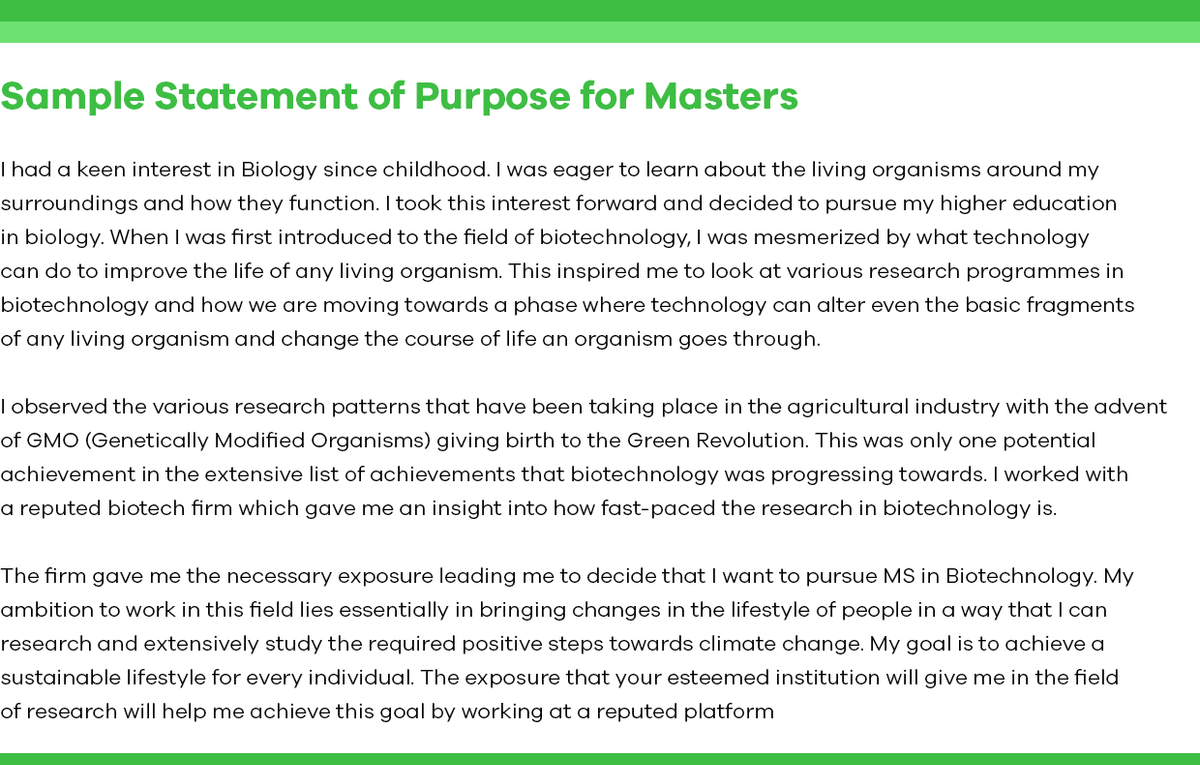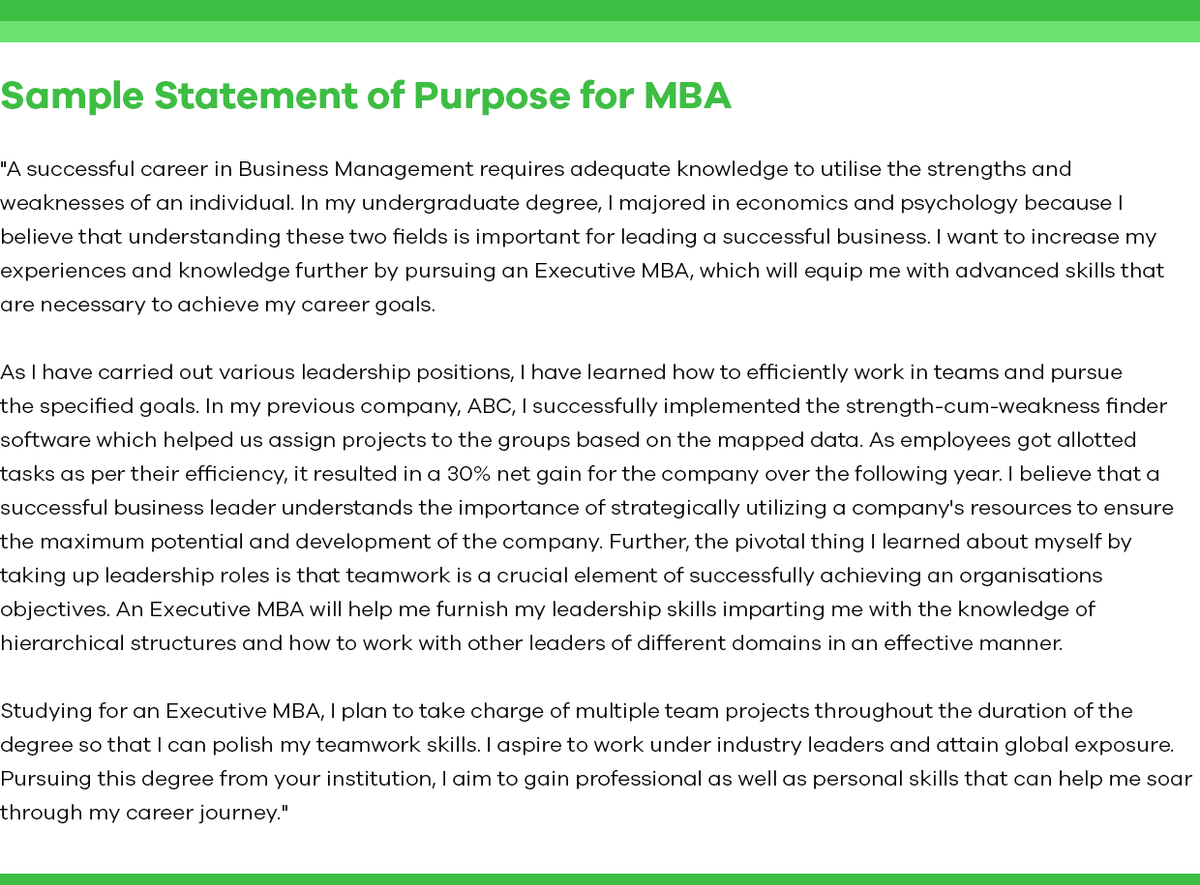Statement of Purpose (SOP): Get Writing Tips, & Templates
6 mins read 6543 Views
By Prabhadri Suman|Updated On - 2023-06-20 07:22:59
Statement of Purpose (SOP) is your chance to be accepted into a university. Learn how to write it with tips and format examples for MBA, BA, and Master.

Topics Covered:
- What is SOP?
- Why SOPs are so important?
- What Should be Included in a Statement of Purpose?
- SOP for UG Courses vs. SOP for PG Courses
- What do colleges look for in an SOP?
- Do’s and Don’t for Your SOP Application
- How Long Should an SOP Be?
- Can SOPs help with Scholarships?
- 5 Tips to Write a Successful Statement of Purpose
- Check out the SOP Sample for Business Analytics
- Check out the Sample Statement of Purpose for Masters
- Check out the Sample Statement of Purpose for MBA
- Conclusion
As a student, you may have come across the term 'Statement of Purpose.' You may have even been asked to write one. But how much do you really know about this subject? Have you ever written one? The SOP is an essential document to have on hand because it sets the tone for the rest of your career. If you've never written one or are planning to write one, this blog will give you a crash course.
What is SOP?
The statement of purpose (SOP) is an important document that every student must prepare and submit as a part of his/her application when applying to a university or a program. It is a personal statement written to provide the reader with details about 'why' the applicant is applying to the program and 'why' they would make a valuable contribution. Usually, it is submitted in the form of an essay; however, some universities may also ask students to keep it question-based. In fact, it is the most integral part of the admission process to a foreign university that decides the admission of students to their preferred institute.
Why SOPs are so important?
In order to be accepted into a college or university, applicants are required to submit a lot of paperwork to the college or university, or to one of its schools, in the form of transcripts, recommendations, and an essay. The SOP is a peculiar document and really focuses on applying to competitive institutions. You must prove yourself an excellent candidate during application at different stages. For example, the academic transcript and all other papers serve as evidence of your successes, but it only demonstrates that in numbers and grades. In addition to this, when it comes to SOPs - you have the chance to show real talent. SOPs are the best way to distinguish yourself from other applicants, especially when dealing with hordes of application documents that are similar in most ways.
Planning to apply to study abroad?Get FREE expert guidance.
What Should be Included in a Statement of Purpose?
Some of the vital elements of SOP are:
- Personal background
- Academic details
- Professional experience (full or part-time)
- Long-term goals
- Reasons why you wish to study at this particular institution
- Reasons for being interested in the chosen field
- Extra-curricular activities
- Assignments taken during studies
- Published works, if any
- Papers submitted, if any
- Interests, hobbies
- Financial background
- Internships, if any
- Motivation and career aspirations
SOP for UG Courses vs. SOP for PG Courses
The Statement of Purpose (SOP) is essential to the college or university application process. It is a crucial document that helps the admissions committee understand the applicant's motivation, background, and future goals. SOPs for undergraduate (UG) and postgraduate (PG) courses may seem similar on the surface, but they have distinctive differences that should be considered when drafting them. This comprehensive guide will compare and contrast SOPs for UG and PG courses. It will provide an in-depth understanding of their characteristics and offer valuable tips on crafting an effective SOP for each level.
Purpose of SOP for UG Courses
The primary purpose of an SOP for UG courses is to showcase the applicant's motivation, aptitude, and commitment to their chosen field of study. The applicant is typically a high school graduate with limited professional experience at this stage. Consequently, the focus should be on their academic achievements, extracurricular activities, and personal interests that demonstrate their potential to excel in their chosen field.
Key Components of SOP for UG Courses
- Introduction : Briefly introduce yourself, your background, and your reasons for choosing the specific course and institution.
- Academic Achievements : Highlight your academic accomplishments, including grades, awards, and relevant coursework.
- Extracurricular Activities : Showcase your involvement in clubs, societies, sports, or community service that demonstrates your leadership, teamwork, and other soft skills.
- Personal Interests : Discuss hobbies and interests that align with your chosen field of study or demonstrate your well-rounded personality.
- Future Goals : Outline your short-term and long-term goals, emphasizing how the UG course will help you achieve them.
- Conclusion : Summarize your strengths and express your enthusiasm for joining the institution.
Purpose of SOP for PG Courses
The SOP for PG courses aims to demonstrate the applicant's in-depth knowledge, analytical skills, and research potential in their chosen field. At this level, the applicant is expected to clearly understand their career goals and the specific aspects of the subject they wish to explore further. The focus should be on the applicant's academic achievements, professional experience, research interests, and the reasons for choosing the particular institution and program.
Key Components of SOP for PG Courses
- Introduction : Present a brief overview of your background, your motivation for pursuing the specific PG course, and the reasons for selecting the institution.
- Academic Achievements : Emphasize your undergraduate accomplishments, including grades, awards, research projects, and any published work.
- Professional Experience : Detail any relevant work experience, internships, or training that has prepared you for the program and supports your career goals.
- Research Interest: Please provide clear instructions regarding the research direction, preferred collaborators, and the resources available at the institution that would aid in your research.
- Any leadership experience or community service : Provide a clear and detailed account of your exceptional accomplishment, outlining the planning, training, goals, and steps taken to ensure its success. Kindly highlight your role in the process and any leadership you provided.
- Conclusion : As the concluding paragraph, expressing your enthusiasm and readiness for the chosen course is essential. You should sound determined and equipped to tackle any obstacles that may arise.
What do colleges look for in an SOP?
Your Writing Capability:
The essay must possess a clear and logical structure. It is vital to have a well-planned idea development and proper paragraphing. The essay should be composed of concise paragraphs that narrate your ambitions, personality, and accomplishments. Your writing must be compelling and expressive. While your personal style plays a crucial role in this, using an active voice and mixing up your sentence structures is advisable.
Uniqueness:
Many times, candidates write essays that fail to reveal their true selves. A solid personal statement must enable the admission team to see beyond the figures and understand the kind of individual you are. Given that the admission committee cannot meet you in person, your essay should convey a sense of personal connection, making them feel as if they have indeed gotten to know you.
What Will You Bring to the Community?
When applying to universities, showcasing how you can contribute to the community is essential. Many universities highly value cultural diversity among their students. As an international student, it's not enough to simply mention your country or culture. You need to explain how you can use your cultural background to enrich the community and share it with your peers and the University. This is where your uniqueness comes into play. Writing a great essay requires introspection to identify your strengths and how you can best present them. Be specific about your cultural experiences and how you can share them with the campus and surrounding community to stand out.
Familiarity with the University:
The admissions committee expects that you have conducted comprehensive research on the program and have made an informed decision while applying. It is crucial to show your interest in the program by highlighting the specific aspects that appeal to you. You can mention your interest in particular professors and explain why their work intrigues you. Additionally, you can let the admissions committee know that you have found the school to be an ideal match after following the school on social media or receiving feedback from alumni or current students.
Check out more on How to write a perfect SOP?
Do’s and Don’t for Your SOP Application
1. Understanding the Importance of an SOP
Don'ts
- Don't underestimate the significance of your SOP. It is a vital part of your application that allows the admissions committee to evaluate your preparedness, background, and suitability for the program.
- Don't procrastinate on starting your SOP. Give yourself ample time to brainstorm, write, revise, and edit your essay.
Do's
- Recognize an SOP's crucial role in your application and treat it with the attention it deserves.
- Begin working on your SOP early, allowing yourself enough time to create a polished and well-thought-out piece.
2. Honesty and Authenticity
Don'ts
- Don't have someone else write your SOP for you. Not only is it unethical, but you are also the best spokesperson for yourself.
- Don't exaggerate or fabricate your accomplishments, experiences, or qualifications.
Do's
- Be honest and genuine in your writing, showcasing your true self and experiences.
- Own your background and your story without comparing yourself to other applicants or the program's standards.
3. Content and Structure
Don'ts
- Don't list every activity or accomplishment you've ever had. Your application will likely have a section for these details.
- Don't include irrelevant or unnecessary information that doesn't support your main points or strengthen your application.
Do's
- Start your SOP with a summary of your accomplishments and preparedness for the program.
- Discuss your background, education, and community involvement, explaining how these experiences have influenced your interest in your chosen field.
- Share your learning experiences, hands-on exposure, and any leadership roles that have shaped your career objectives and goals.
- Focus on specific examples and experiences, avoiding generic or vague statements.
- Allow your personality and individuality to shine through, giving insights into your motivations, dedication, and aspirations.
4. Addressing Weaknesses or Lapses
Don'ts
- Don't ignore or avoid discussing any weaknesses or gaps in your academic or professional background.
- Don't make excuses or blame others for your shortcomings.
Do's
- Take responsibility for your past and use the SOP as an opportunity to provide context or explanations for any weaknesses or lapses in your record.
- Emphasize how you have grown or learned from these experiences and how they have contributed to your overall development.
5. Showcasing Your Strengths and Uniqueness
Don'ts
- Don't be overly humble or apologetic about your strengths and achievements.
- Don't solely rely on clichés or overused phrases to describe your qualities.
Do's
- Be confident in presenting your skills, strengths, and unique attributes.
-
Use specific examples and anecdotes to demonstrate your qualities, showcasing your passion and commitment to your chosen field.
6. Tailoring Your SOP to the Program and School
Don'ts
- Don't use a generic statement for all your applications. Tailor your SOP to each program and school you are applying to.
- Don't explicitly mention your interest in a specific school when sending a general application to multiple schools, and vice versa.
Do's
- Research each program and school thoroughly, highlighting how their offerings align with your educational and career goals.
- Demonstrate your knowledge of the program and school, explaining why they are the ideal fit for you and your aspirations.
7. Writing Style and Tone
Don'ts
- Don't use overly complex language or jargon in an attempt to impress the admissions committee.
- Don't adopt a casual or informal tone in your writing.
Do's
- Maintain a professional and polished tone throughout your SOP.
- Write clearly and concisely, using language that is accessible to a diverse audience.
8. Proofreading and Editing
Don'ts
- Don't submit your SOP without thoroughly proofreading and editing it for spelling, grammar, and punctuation errors.
- Don't rely solely on your own proofreading abilities. It's easy to overlook errors in your own writing.
Do's
- Edit and revise your SOP multiple times, ensuring it is error-free and well-written.
- Seek feedback from others, such as friends, family, or professional advisors, to gain different perspectives and insights on your essay.
9. Presentation and Formatting
Don'ts
- Don't neglect the appearance and formatting of your SOP, as it can impact the reader's impression of your application.
- Don't use a font that is too small or difficult to read.
Do's
- Adhere to the guidelines for length, margins, and formatting the program or school provides.
- Ensure your essay is neat, organized, and visually appealing, making it easier and more enjoyable for the reader.
10. Preparing for Interviews
Don'ts
- Don't go into an interview without reviewing your SOP and knowing what you wrote.
- Don't be unprepared to discuss and defend the points you made in your essay during the interview.
Do's
- Familiarize yourself with your SOP before any interviews, as it may be a topic of discussion.
- Be ready to speak confidently about your experiences, goals, and motivations, demonstrating your commitment to your chosen field.
How to Write a Good Statement of Purpose?
To craft a compelling SOP, follow these strategies to ensure clarity, coherence, and impact.
1. Plan Your Content:
Before you start writing, create an outline of the key elements you want to include in your SOP. This will help you organize your thoughts and ensure that your statement flows logically and coherently.
2. Be Specific and Concise:
Avoid general statements and cliches. Instead, be specific about your experiences, achievements, and goals. Use concrete examples to illustrate your points, and keep your language concise and to the point.
3. Show, Don't Tell:
Rather than simply stating your qualities and strengths, demonstrate them through examples and anecdotes. This makes your SOP more engaging and helps the reader understand the impact of your experiences on your personal and professional growth.
4. Be Authentic and Genuine:
Write in your own voice and be true to your experiences, motivations, and goals. Avoid exaggerating your achievements or using flowery language to impress the reader. Authenticity and sincerity will make your SOP more compelling and memorable.
5. Edit and Revise:
Once you have completed your SOP, set it aside for a few days before reviewing it with a fresh perspective. Edit your statement for clarity, grammar, and sentence structure, and revise it to ensure that it effectively conveys your message and aligns with your goals.
How Long Should an SOP Be?
If you are considering applying to a prestigious international university, it is recommended that your statement of purpose be between 1-2 pages in length and around 1000 words. However, the specific word limit and length may vary depending on the university and degree level. For instance, candidates applying for undergraduate programs should aim for 800 to 1000 words, while those applying for Ph.D. or M.Phil programs should aim for around 1200 words or more. Certain universities may also have a uniform length and word count for all programs.
| S No. | Study Program | Font Size | Word Limit | No. of Pages |
| 1 | Bachelor’s degree | 11 - 12 | 800 - 100 | 1 - 2 pages |
| 2 | Master’s degree | 11 - 12 | 800 - 100 | 1 - 2 pages |
| 3 | Doctoral (Ph.D) | 11 - 12 | 1000 - 1200 | 2 - 3 pages |
| 4 | Research | 11 - 12 | 1000 - 1200 | 2 - 3 pages |
Can SOPs help with Scholarships?
During the college application process, if you are deemed eligible for any scholarships specific to the institution, you may be asked to provide a separate essay or statement of purpose. This may include a specific essay prompt or a request for an SOP explaining why you believe you deserve the scholarship and what sets you apart from other candidates. It's important to note that a scholarship SOP differs from a generic SOP.
5 Tips to Write a Successful Statement of Purpose
To ensure that your SOP stands out from the competition, consider the following tips:
Tailor Your SOP to Each Institution:
Research the specific requirements, values, and expectations of each institution you are applying to and tailor your SOP accordingly. This demonstrates your genuine interest in the program and your commitment to the institution.
Address Any Weaknesses or Gaps in Your Application:
Address any weaknesses or gaps in your application, such as low grades or gaps in your academic or professional history, in your SOP. Explain the reasons behind these issues and emphasize your growth and determination to overcome them.
Seek Feedback and Guidance:
Ask for feedback and guidance from mentors, professors, or colleagues who are familiar with your field of study and the application process. Their insights can help you refine your content and improve the overall quality of your SOP.
Maintain a Professional Tone:
While showcasing your personality and personal qualities is essential, maintain a professional tone throughout your SOP. Avoid using slang, jargon, or overly casual language, and ensure that your statement is well-organized and easy to read.
Proofread and Edit Thoroughly:
Finally, proofread your SOP several times to ensure that it is free of grammatical, spelling, or punctuation errors. A well-written, polished statement will create a positive impression on the admission committee and increase your chances of success.
Check out the SOP Sample for Business Analytics

Check out the Sample Statement of Purpose for Masters

Check out the Sample Statement of Purpose for MBA

Conclusion
It can be daunting for students to write an SOP. It is an essential document and has to be highly persuasive. You have to talk about your interests and extracurricular activities and explain why a particular college should accept you. You have to show the admissions committee that you have the drive and the desire to make the most of your college education. You have to be able to convince them that you are a perfect fit for the college. This is why many students seek the expertise of professional SOP writers. The writers will help you present your SOP in the best possible way so that the admissions committee won’t be able to say no to your application.
As Canada is the primary choice for overseas students, many foreign students want to know how to write an SOP for Canada in order to submit their applications to Canadian institutions and universities to begin their global careers. Prepare yourself to study in Canada .
We at Edmissions can help you make the SOP writing feel like a breeze. We have experts who have been in your shoes and helped thousands of students like you. We can help you write the perfect SOP. There is no college too tricky for us to work with.
Edmissions is the one-stop solution that bridges the information gap between students and the authentic information they need to make the right decision about studying abroad . Get in touch with us at edmissions.com . For more information, contact our admissions specialists at [email protected].
For a quick overview related to study abroad, click here
Latest Blog Posts
Trending Posts
Popular Colleges to Study Abroad
Blog FAQ's
Top Study Abroad Exams
Popular Universities to Study Abroad
- University of Waterloo
Waterloo
- University Canada West
Vancouver
- University of Windsor
Windsor
- Cape Breton University
Sydney
- Dalhusie University
Halifax
- Carleton University
Ottawa
- University of Ottawa
Ottawa
- University of Guelph
Guelph
- Explore more colleges in Canada
- University of New Haven
West Haven
- Kent State University
Kent
- Wright State University
Dayon
- San Jose State University
West Haven
- Clark University
Worcester
- Rowan University
Glassboro
- Golden Gate University
San Francisco
- Arkansas
San Francisco
- Explore more colleges in USA
- Coventry University
Coventry
- University of Birminghame
Birminghame
- De Montfort University
Leicester
- Cardiff University
Cardiff
- BPP University
London
- University of West London
London
- University of Nottingham
Nottingham
- University of Warwick
Coventry
- Explore more colleges in UK
- Auckland Institute Of Studies
Auckland
- Massey University - Auckland Campus
Albany
- Eastern Institute of Technology - Auckland Campus
Auckland
- NorthTec - Auckland Campus
Auckland
- Massey University - Manawatu Campus
Palmerston North
- University of West London
London
- Wellington Institute of Technology (WelTec) - Petone Campus
Lower Hutt
- Otago Polytechnic - Dunedin Campus
Dunedin
- Explore more colleges in New Zealand
- Chandigarh University
Mohali
- Parul University
Vadodara
- Sharda University
Greater Noida
- Jain University
Bangalore
- Bennett University
Greater Noida
- Lovely Professional University
Phagwara
- Chitkara University
Rajpura
- Brainware University
Kolkata
- Explore more colleges in India
- Abu Dhabi University
Abu Dhabi
- Gulf Medical University
Ajman
- New York University
Abu Dhabi
- Emirates Aviation University
Dubai
- Higher Colleges of Technology
Dubai
- British University in Dubai
Dubai
- Al Ghurair University
Dubai
- American University in the Emirates
Dubai
- Rochester Institute Of Technology Dubai
Dubai
- Emirates Academy of Hospitality Management
Dubai
- American University of Ras Al Khaimah
Ras Al Khaimah
- Explore more colleges in UAE
- Ras Al Khaimah Medical and Health Sciences University
Ras Al Khaimah
Search, Shortlist, Apply and get accepted! It’s that Simple to pursue your dream to Study abroad with Edmissions. Our team of experts provide you the right guidance that helps you to take admission in your dream college in countries like Canada, the USA, the UK
© 2021-2024 Edmissions - All rights reserved.
TALK TO OUR EXPERTS











